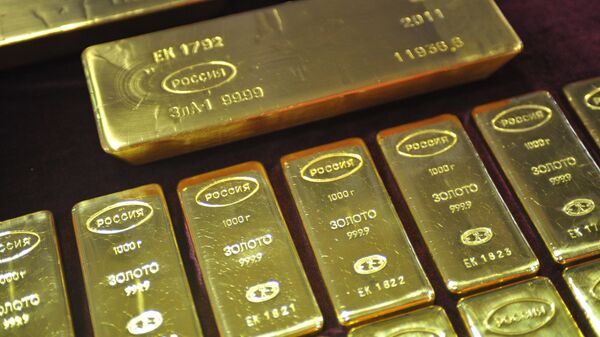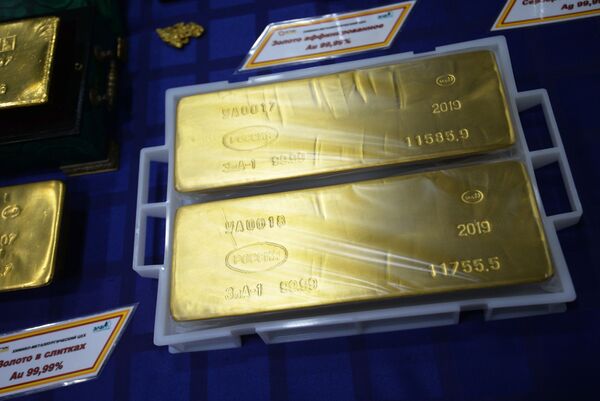Russian gold and foreign exchange reserves are set to outstrip those of Saudi Arabia, allowing Moscow to "leapfrog" Riyadh in international rankings, while the top spots are held by China, Japan, and Switzerland.
The steadily growing stockpile would likely provide Russia with increased influence within OPEC and stabilise its national currency, the rouble, even in the event of plummeting oil prices.
'Sluggish' Demand for Oil
The assessment was made by Bloomberg analysts, who concluded that Russian international reserves have grown by 45 percent over the past four years, while according to the data released by the Central Bank of Russia, the figure amounted to roughly $520 billion in late July.
Over the same four-year span, Saudi gold and foreign currency reserves have shrunk by a quarter, from $700 billion in April 2015 to $527 billion in June 2019, thus reducing the gap between Moscow and Riyadh.
Intriguingly, both economies are dependent on hydrocarbon exports — and the situation on the oil market is increasingly uncertain.
According to a monthly report by the International Energy Agency (IEA), in the first five months of 2019, world demand for black gold grew by only 520,000 barrels per day, which is the lowest figure since the financial crisis of 2008.
The agency assessed that the ongoing trade wars, which have already caused the collapse of the shipping industry around the world, to be the main reason for the "very sluggish" demand for fuel. The unresolved trade dispute between China and the United States and the imposition of new US tariffs on Chinese goods in September will only excerbate the existing trend, pushing the demand for transport fuel, as well as oil prices, into further decline.
If developments unfold this way, Saudi Arabia will have to spend money from its reserves, while in Russia the situation is different.
Putting All Eggs in a Golden Basket
In the past few years, Russia has steadily stockpiled gold, becoming the world's largest buyer of the precious yellow metal in the first quarter of 2019, while simultaneously drastically reducing its US Treasury holdings as part of a so-called de-dollarisation drive (from $160 billion in early 2013 to $10.8 billion in June 2019).
Saudi Arabia holds more than $170 billion in US Treasuries, but its gold reserves accounted for only 0.08 percent as of June, while the share of precious metals in the reserves of the Bank of Russia skyrocketed from 3.5 to 18.6 percent over a five-year span.
Meanwhile, the yield of US government securities last week fell to record low values - less than two percent per annum. Gold is updating long-term records, having risen in price from $1,280 in early June to $1,530 last Friday.
Given that gold prices bounced back to the $1,530 mark last Friday from $1,280 in early June, it's no wonder that in the first week of August alone, the Bank of Russia's foreign exchange reserves increased by $10.2 billion to $527.1 billion.
The price of the precious metal is expected to continue to grow amid investors' mounting concerns about a looming global crisis, or a so-called "wall of worry", that include trade wars, Brexit, political crisis in Venezuela, protests in Hong Kong, escalating tensions in Iran, and the renewed row between India and Pakistan over the disputed region of Kashmir, etc.
The "wall of worry" was complemented by an odd bond market phenomenon in the US on Wednesday: the yield on the benchmark 10-year Treasury note broke below the two-year rate, which basically means that investors are better compensated for loaning the US over two years than for 10 years.
The so-called inversion has been a reliable indication for economic recessions, with economists giving the spread between the 10-year and the two-year special attention: a similar phenomenon was observed in December 2005, two years before the financial crisis and subsequent recession.
'Stockpiling' Influence?
With the "wall of worry" in sight, investors are not willing to take a risk, which leaves them with no option but to transfer money from stocks to gold - this, in turn, will push the demand for precious metal and cause its price to surge. Analysts at the Switzerland-based Julius Baer Bank believe that in the next three months, gold will rise in price to $1,575 per ounce.
Subsequently, the value of Russian gold reserves will see an upswing, which practically guarantees fourth place in international rankings.
"OPEC can no longer ignore Russia because of its importance as an oil exporter and its economy. The Russians will continue doing just enought to engage with the Saudis on oil production", Bloomberg cited Elina Ribakova, deputy chief economist at the Institute of International Finance in Washington, as saying.
Aside from gaining more clout within OPEC, the nation's growing international reserves would guarantee the rouble's stability regardless of fluctuations in world oil prices.


